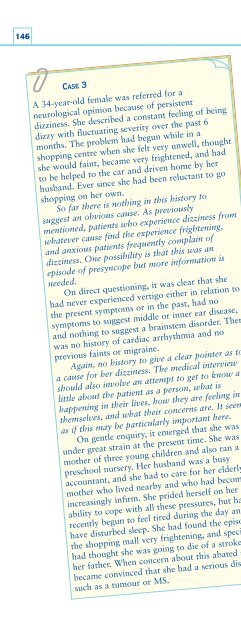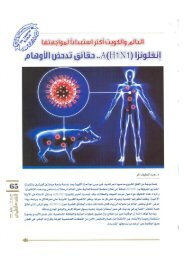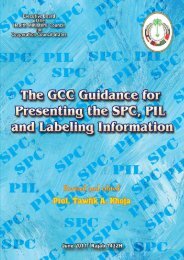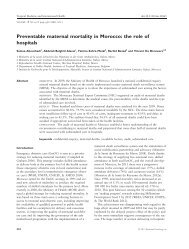Create successful ePaper yourself
Turn your PDF publications into a flip-book with our unique Google optimized e-Paper software.
146CASE 3A 34-year-old female was referred for aneurological opinion because of persistentdizziness. She described a constant feeling of beingdizzy with fluctuating severity over the past 6months. The problem had begun while in ashopping centre when she felt very unwell, thoughtshe would faint, became very frightened, and hadto be helped to the car and driven home by herhusband. Ever since she had been reluctant to goshopping on her own.So far there is nothing in this history tosuggest an obvious cause. As previouslymentioned, patients who experience dizziness fromwhatever cause find the experience frightening,and anxious patients frequently complain ofdizziness. One possibility is that this was anepisode of presyncope but more information isneeded.On direct questioning, it was clear that shehad never experienced vertigo either in relation tothe present symptoms or in the past, had nosymptoms to suggest middle or inner ear disease,and nothing to suggest a brainstem disorder. Therewas no history of cardiac arrhythmia and noprevious faints or migraine.Again, no history to give a clear pointer as toa cause for her dizziness. The medical interviewshould also involve an attempt to get to know alittle about the patient as a person, what ishappening in their lives, how they are feeling inthemselves, and what their concerns are. It seemsas if this may be particularly important here.On gentle enquiry, it emerged that she wasunder great strain at the present time. She was amother of three young children and also ran apreschool nursery. Her husband was a busyaccountant, and she had to care for her elderlymother who lived nearby and who had becomeincreasingly infirm. She prided herself on herability to cope with all these pressures, but hadrecently begun to feel tired during the day and tohave disturbed sleep. She had found the episode inthe shopping mall very frightening, and specificallyhad thought she was going to die of a stroke likeher father. When concern about this abated shebecame convinced that she had a serious disordersuch as a tumour or MS.The neurological and general medicalexaminations were normal. Specifically,there was no evidence of vestibular disorder,nothing to suggest other neurologicaldisease, and the cardiac examination wasunremarkable.All of the above suggests that thecomplaint of dizziness is related to her lifesituation and not disease of the nervoussystem. The strict psychiatric terminologyfor her symptoms would require expertassessment and a great deal moreinformation, but physical symptoms of‘stress’ are very common, especially inpatients who ‘cope’ with difficult andstressful lives. Such patients are oftenresistant to a psychological or stress-relatedinterpretation of their symptoms, largelybecause they seem so real and serious.Terminology in this area is notoriouslydifficult. ‘Somatization’ refers to the processwhereby mental distress is expressed inphysical symptoms. ‘Functional neurologicalsymptoms’ is a better term, implying adeficit of functioning of the nervous system,rather than a structural disorder of it. Thebrain can frequently produce physicalsymptoms that suggest a disorder of thebody and hence cause illness withoutevident disease.An explanation that there was no signof serious disease as feared by the patientproduced a degree of relief but thesubsequent suggestion that the symptomsmight be stress-related was met withconsiderable scepticism. Eventually normalinvestigations including cerebral imagingtogether with the support of her family andphysician encouraged her to makealterations in her life that led to theultimate resolution of her symptoms.
















